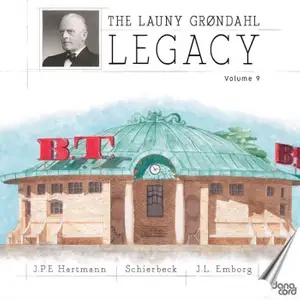
The Launy Grøndahl Legacy Volume 9
Danish Radio Symphony Orchestra and Radio Choir
rec.1953-56, live studio broadcasts and festival concerts and an HMV studio recording
No texts
Danacord DACOCD889 [2 CDs: 137]
The Launy Grøndahl Legacy releases from Danacord aren’t as regular as the label’s Thomas Jensen discs but nevertheless they have still reached volume 9. These 1950s radio recordings capture Denmark’s classicism in the shape of J.P.E. Hartmann’s stage works and move forward to include music by Nielsen’s pupil, Poul Schierbeck, and by the less well-known figure of Jens Laursøn Emborg.
The excerpts from Hartmann’s Ysra last thirteen minutes, over half of which time is taken up by the stirring, epic Overture. The other highlight is the sensitively orchestrated orchestral interlude Freya and Ysra. The radio production included spoken text which has been omitted here but you still hear the female voices of the Danish Radio Choir in three brief excerpts. A much earlier Hartmann work, A Summer Day, dates from 1854 and this idyll enshrines his gift for melodic warmth and light-hearted freshness. The Prelude to Act 2 of A Folk Tale has a Weber-like energy and confidence in handling orchestral detail. The excerpts from Hartmann’s early romantic comedy The Day of the Seven Sleepers are genial, atmospheric and sport another telltale Weber-inspired Hunters’ Chorus and feature vocal contributions from the personable duo of Otte Svendsen and Ruth Guldbæk. The striking Funeral March for Bertel Thorvaldsen is the only commercial recording in this set, coming from a 1947 Danish HMV disc, and played by brass, winds, organ (Palle Asfelt) and timpani drawn from the Danish Radio Symphony.
Schierbeck’s Symphony No.1 is only a torso containing the two inner movements, the Lento and Allegretto. As this was broadcast on the same day as the Constitution Cantata, which is contained on the second disc, I assume that these two movements were all that were broadcast. The slow movement has a marvellous stillness and sense of colour – very distinctive – and the ensuing Allegretto has a jaunty brio enhanced by a semi-outrageous and very Nielsen-like trombone glissando.
The Constitution Cantata was composed in 1941 to mark the signing of the first Danish Constitution in 1849, a day that’s celebrated throughout the country. At its first performance in 1941 the composer’s wife Sylvia Schierbeck sang, something she does again in this 1953 performance. The text is by the poet and lawyer Kai Hoffmann and the work is set for pairs of singers – baritone Holger Nørgaard joins Schierbeck – male and female reciters, the Danish Radio Choir, a Boys Choir and the orchestra. This makes it sound rather more formidable than it actually is – a tuneful, attractive and very singable celebratory work conceived in the ‘olden style’. The unaccompanied choruses are especially attractive and the confident, affirmative final panel brings this occasional work to a fine end.
Jens Laursøn Emborg was 80 in 1956, the year of this broadcast of his choral work Our Mother Earth. It had been written in 1941 as a competition submission for the inauguration of the new Radio House of Danish Radio. A fellow prize winner was Vagn Holmboe for his Sinfonia sacra as were Svend S Schulz, Walther Jansen and Knud Jeppesen. Unlike the constitutional legalities of Schierbeck’s cantata, Emborg’s is to do with nature depiction, and each brief movement sets poems by two Danish poets, Jeppe Aakjær and Thøger Larsen, which Emborg overwhelmingly treats in folk style. Therefore, there is plentiful birdsong in Spring, lively giocoso writing in With a Cycle, the lament of Rainy Weather and the energetic vitality of Work. Festive brass irradiates the Farmer’s Wedding and there is a correspondingly extensive chorus in The Norns. The most touching music is in the penultimate panel, Child and Mother, where Emborg fines down his orchestral accompaniment with great delicacy.
Both these choral works are played and sung with great efficiency and attention to detail, and Grøndahl lives up to his reputation as an admirable exponent of his country’s musical heritage.
There are no texts, which is a stumbling block for the choral works in particular, but Danacord give track headings that hint at what follows, and these things keeps costs down for the consumer.
As always, there is an erudite booklet note to read, courtesy of Martin Granau and Peter Quantrill, and the twofer is available for the price of one.
Jonathan Woolf
Buying this recording via a link below generates revenue for MWI, which helps the site remain free


Contents
J.P.E. Hartmann (1805-1900)
Ysra, Op.78 (1881-82) – excerpts
A Summer Day (1854)
A Folk Tale (1854)
The Day of the Seven Sleepers (1840)
Funeral March for Bertel Thorvaldsen (1844)
Poul Schierbeck (1888-1949)
Symphony No.1, Op.15 – Movements II and III only (1917-21)
Constitution Cantata, Op.55 (1941)
Jens Laursøn Emborg (1876-1957)
Our Mother Earth, Op.91 (1941)
Other performers
Otte Svendsen (tenor) and Ruth Guldbæk (soprano) – Hartmann: The Day of Seven Sleepers
Ellen Malberg and Svend Methling (reciters): Sylvia Schierbeck (soprano): Holger Nørgaard (baritone) – Schierbeck: Constitution cantata
Dorothy Larsen (soprano): Lilian Weber-Hansen (alto): Erik Sjöberg (tenor): Johannes Astrup (bass) – Emborg: Our Mother Earth

















